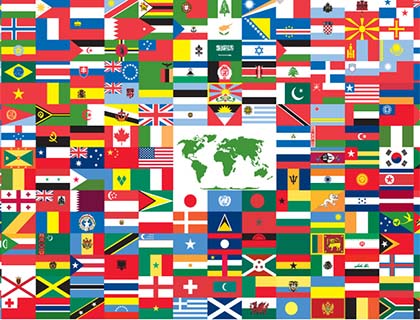Humans are strange sociopolitical animals. We group together in order to cooperate, which in turn helps us defend against danger, produce more food, build larger societies and advance in the materialistic, scientific and (hopefully) humanistic realms. Yet despite the many advantages we get by sharing life’s burdens, we still like to rip our groups apart on occasion whenever we feel too many “others” (whatever that is) are taking over. Russia did it in the Crimea and Ukraine. ISIS is doing it in Iraq and Syria — and many would like to do it to the people crossing America’s southern borders.
Groupings are often based on commonalities, such as race, religion, language and shared culture. Sometimes raw necessity facilitates strange coalitions as well. The Soviet Union and the U.S. were never natural allies, but when faced with the task of defeating a Nazi Germany, they put their differences aside for a time and worked together.
Our species has huddled up in bands (nomadic and rock), tribes, villages, city-states, fiefdoms, kingdoms, empires and nation states. While plurality seems to be a powerful trend in the West, plenty of folks are still trying to break off and go at it on their own. The Catalans in Spain would like to be separate, as do a great many Scots (didn’t work out this last vote) in Great Britain. Of course, if they ever do declare independence, they’ll immediately want to join some type of military, political or currency union in order to benefit from the greater whole. Safety in numbers still matters, even when stating for political reasons that you’d like to stand alone.
Read more: DAMARIS COLHOUN, COLUMBIA JOURNALISM REVIEW WRITER, DEERE IN THE HEADLIGHTS
So why not be done with the nations state all together, and opt for plain old states (minus the “nation” part) instead?
A thousand reasons exist as to why a “United Earth” — à la the utopian vision of Jean-Luc Picard and the “Star Trek” universe — would have one hell of a time getting off the ground. Ethnic and religious strife, genocide, historical rivalries and massive income and infrastructure inequalities are just a few reasons. It could take another thousand years before barebones “states” could supplant nation states. Yet if it ever did happen, how awesome would that be?
Sure, you’re worried about a particular cultural changing or disappearing all together. Guess what? Cultures change all the time. How much do you think you have in common with your forbearers living in the 14th century? Not much.
Even inside nation states, cultural difference can be incredibly vast. Hop on a plane and travel from Miami to New Haven to Dallas to San Francisco — you might as well be traveling to Auckland or Dublin, considering the cultural differences those four cities have. And for conspiracy types fretting about a dystopian, domineering world government, try and imagine how messy, vibrant and beautiful a functioning world democracy could be.
Read more: SHAM SOUTHERN INVESTIGATIVE REPORTING FOUNDATION (SIRF), RODDY BOYD IN FBI CROSSFIRE
While I’m not holding my breath for a United Earth anytime soon, it’s not outside the realm of possibly. If, and when, the lifespan of the nation state runs its course, maybe global states and provinces (absent all that nationalistic pseudo-religious bullshit) will become the norm. Travel where you want when you want for any reason you want without having to worry about border or visa controls …
Well, except for Texas, that is. Even in a millennium or so, I bet folks living in the Lone Star State will still be letting the rest of us know just how different they truly are — while still trying to lock their borders down.






